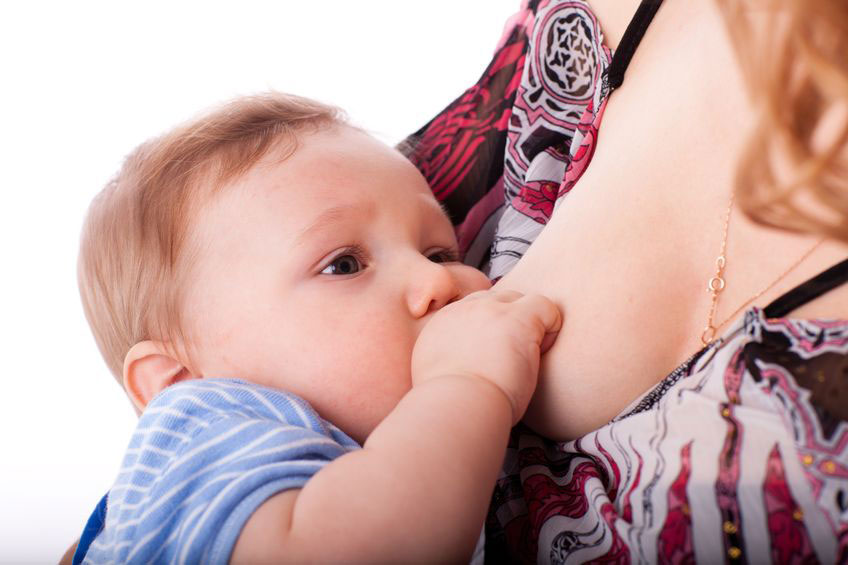Nicotine is a substance naturally found in tobacco plants and released during smoking. It is very addictive and some studies say it could affect the heart, respiratory and reproductive systems and the lungs in addition to other side effects.1 However UK’s National Health Service states that it is the other toxic chemicals in cigarettes that cause most of the harm from smoking and nicotine itself does not cause cancer, lung disease, heart disease or stroke.2 For a review of how smoking generally affects your baby see Smoking While Breastfeeding. This article looks at how nicotine in breast milk might affect the breastfed baby and answers frequently asked questions.
Does nicotine get into breast milk?
Nicotine is readily absorbed into breast milk from the mother’s blood whenever she smokes or uses nicotine replacement therapy 3 and her baby will also breathe in nicotine directly if exposed to side smoke.
How do nicotine levels in breast milk compare to passive smoking?
Bajanowski et al found nicotine levels in a baby’s blood were much greater from passive smoking than from ingesting nicotine in breast milk.4 However another older study found ten times as much cotinine (a metabolite of nicotine with a much longer half life that can be measured in blood, urine, saliva, hair and nails) in breastfed babies of smoking mothers compared with bottle fed babies of smoking mothers suggesting more nicotine came via the milk. 5

How could nicotine affect my baby?
Nicotine in breast milk may:
- Reduce a baby’s appetite as nicotine is a known appetite suppressant that also flavours breast milk.6
- Lead to vomiting and nausea if a mother is smoking 20 cigarettes or more daily7 and may cause diarrhoea and increase a baby’s heart rate (Fisher, 2006).
- Cause disturbed sleep with higher nicotine exposure because nicotine is a stimulant.8
- May increase the risk of SIDS by affecting the way a baby can resuscitate during hypoxic episodes (when the body doesn’t have enough oxygen).9
- Interfere with normal infant lung development (LactMed, 2023).
- Be a risk factor for childhood obesity and thyroid dysfunction.10
Studies have not been carried out to resolve many of these concerns (LactMed, 2023).
What about other contaminants?
Tobacco contains much more than just nicotine and it is not only nicotine that will cross into breast milk—so will other contaminants. Lung.org11 credits 600 different ingredients to cigarettes from nicotine, tar, and arsenic to carbon monoxide, lead and many more. When smoked, these 600 chemicals become many thousands of harmful pollutants that both you and your baby can breathe in. E-lactancia says:
The milk of smoking mothers contains higher levels of Nicotine, Cotinine, Cadmium, Mercury, Lead and other heavy metals, and lower amount of proteins, Vitamin A, C and E and other antioxidants.
Urinary cotinine levels are elevated in infants of smoking mothers. There is a higher risk of future obesity and lower stature among breastfed siblings of smoking mothers. Heavy smoking during pregnancy and/or breastfeeding was associated with an increased risk of childhood leukemia.
How can smoking affect my baby?
Babies who are exposed to breathing in smoke particles are at a much higher risk of sudden infant death, respiratory tract infections, asthma and frequent hospital admissions (e-lactancia, 2023). Smoking while breastfeeding may cause fussy behaviour, breast refusal, excessive crying, and increased colic in babies of mothers who smoke more than five cigarettes per day (Mennella et al. 2007). See Smoking While Breastfeeding for more about the effects of cigarette smoking during breastfeeding.
Does smoking decrease milk supply?
Academy of Breastfeeding Protocol #21 says that breastfeeding mothers who smoke or vape nicotine products may produce less breast milk and it may be less nutritional.12 Wambach and Spencer mention smoking could reduce the fat content of breast milk.13
Should I stop breastfeeding if I smoke?
It would be better for your baby if you did not smoke. However, a smoker’s breast milk still has health advantages for their baby.14 Current guidelines recommend you continue breastfeeding but that you protect your baby from exposure to breathing in any smoke.1516 Breast milk contains living cells and unique nutrients for your baby’s healthy growth and protection from infections. Formula has none of these protective substances and has its own risks.17
How long does nicotine stay in breast milk?
The levels of nicotine in milk are highest just after a mother finishes her cigarette and over the following two hours the concentration of nicotine in breast milk falls significantly.18 The half life of nicotine in breast milk is one to two hours (ABM Protocol #21, 2023). This means that nicotine levels in breast milk will have fallen by half after about one and a half to two hours after the mother finishes her cigarette. Based on the general guide that it takes five half lives to clear a substance from the body it may take up to ten hours for nicotine to completely leave the mother’s blood or breast milk after one cigarette. In practice although nicotine isn’t stored in breast milk, the levels of nicotine in a mother who smokes regularly throughout the day will accumulate over 24 hours with each cigarette she smokes and breakdown products of nicotine e.g. cotonine remain for much longer.19 Benowitz et al explain:
smoking represents a multiple dosing situation with considerable accumulation while smoking and persistent levels for 24 h of each day.
The authors point out that babies take much longer than adults to eliminate (metabolise) nicotine and cotinine from their bodies. Mennella et al remind us:
cigarette smoke is a complex mixture of chemicals with ~4000 compounds, including >60 carcinogens. Whether compounds other than nicotine and cotonine [a metabolite of nicotine] are transferred to human milk with similar time courses and, if so, what levels are transmitted remain unknown.
How long after smoking can I breastfeed?
Waiting as long as possible after smoking gives time for the nicotine levels in breast milk to fall (after two hours levels will have halved). As breastfed babies generally want to feed at least every two hours, general advice is that smoking straight after breastfeeding will give time for nicotine levels to come down before the next breastfeed (Mohrbacher, 2020) But if the baby wants to breastfeed again sooner, breastfeeding is still said to be better than giving formula (Mohrbacher, 2020).
Should I pump and dump after smoking a cigarette?
As nicotine levels are said to gradually fall in your blood and breast milk after smoking a single cigarette, pumping and dumping (throwing away) your breast milk after a cigarette is not necessary to clear the nicotine from breast milk.

What about nicotine replacement therapy?
For more information about nicotine replacement therapy including patches, gum, and sprays, and for guidance on e-cigarettes, vaping and breastfeeding, see Nicotine Therapy, Vaping and Breastfeeding.
Summary
Nicotine may have a number of side effects for your baby when breathed in via cigarette smoke or swallowed via breast milk. However the effects of nicotine in tobacco are difficult to separate from the other chemicals, tar and smoke that are in cigarettes. Current health guidelines2021 advise mothers to protect their babies from smoke inhalation by not smoking near their baby, making the home and car smoke-free and not sharing a bed with a baby if they—or their partner—smokes.